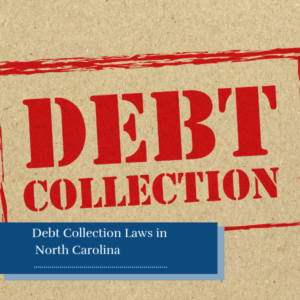Debt Collection Laws in North Carolina

Life is unpredictable. Unforeseen circumstances can lead anyone down a path of financial instability. From sudden job loss to unexpected medical expenses, debt can pile up before you even realize it’s happening.
If you are struggling to keep up with your bills and creditors are knocking at your door, it is important that you understand your legal rights and options. This page gives a brief introduction to consumer protection laws meant to keep unscrupulous debt collectors at bay.
If you have questions or concerns, the skilled legal team at the Sasser Law Firm is here to help. Contact us today to schedule your free, no-obligation consultation. Read on to learn more about debt collection laws.
What is the Fair Debt Collections Act?
The Fair Debt Collections Act (FDCPA) is a federal law that protects consumers from unfair, abusive, and deceptive debt collection practices. The FDCPA applies to all debt collectors, including collection agencies, lawyers, and creditors who collect their own debts but uses a different name as part of the collection efforts.
The FDCPA sets forth certain rules that debt collectors must follow when collecting debts. In addition to these rules at the federal level, North Carolina has set forth its own restrictions meant to protect consumers from unscrupulous debt collectors.
If a debt collector violates the FDCPA or its state-level counterpart, you may be able to sue them for damages. You may also be able to get the debt collector to stop contacting you.
What Are Debt Collection Agencies Allowed to Do?
Of course, when someone owes us money, we are allowed to take reasonable steps to secure repayment. Debt collection agencies are allowed to do the following:
- Contact you in writing or by phone to collect a debt.
- Ask you to verify your identity.
- Ask you to provide information about your employment and income.
- Ask you to make a payment on the debt.
- Send you a copy of the debt validation notice.
- File a lawsuit against you if you do not pay the debt.
What Are Debt Collection Agencies Not Allowed to Do?
On the other hand, federal and state laws have strict consumer protection laws in place that prohibit debt collectors from harassing indebted individuals and otherwise overstepping their right to seek debt repayment. Debt collection agencies are not allowed to do the following:
- Contact you at unreasonable times or places, such as early in the morning or late at night.
- Contact you at your place of employment if they know your employer does not allow it.
- Threaten you with violence or arrest.
- Contact you if you are represented by an attorney
- Notify third parties (with the exception of a spouse in some instances.
- Use abusive language.
- Lie about the debt or your rights.
- Collect a debt that is not yours.
What Is the Statute of Limitations Governing Debt Collection in North Carolina?
The statute of limitations in North Carolina for a breach of contract not under seal is three years. This means that you may have an affirmative defense that should be asserted if you believe the statute of limitations has expired. However, it is important to remember that the statute of limitations can be reset if you take certain actions on your debt.
Consult with a bankruptcy attorney today
Sasser Law Firm offers free consultations to discuss bankruptcy options. The phone number is 919 319 7400.
- About the Author
- Latest Posts
For more than 20 years, the Sasser Law Firm has been helping individuals and business owners sort through financial hardships to see the light at the end of the tunnel. Our North Carolina bankruptcy attorneys are all board-certified specialists, which means we have passed a complex exam, undergone a thorough peer review, and continue to earn legal education credits in this ever-evolving area of law.














